Office of the Presanctified Gifts
Ninth Hour and Typika
(no morning services: hybrid week)
D.Min. Faculty Member Ordained to the Holy Diaconate
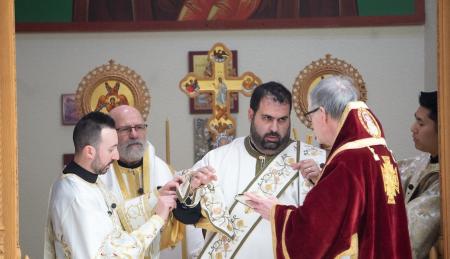
On Sunday, January 12, Assistant Professor of Pastoral Theology in the Doctor of Ministry program at St Vladimir’s Orthodox Theological Seminary (SVOTS), Subdeacon Dr Gregory Abdalah (M.Div. ‘08, D.Min. ‘18) was ordained to the holy diaconate by the hand of his own father, His Grace Bishop John (M.Div. ‘78), Auxiliary Bishop for the Diocese of Worcester and New England, Antiochian Orthodox Christian Archdiocese of North America (AOCANA), and member of the SVOTS Board of Trustees. His Grace Bishop Anthony (M.Div. ‘82), Auxiliary Bishop for the Diocese of Los Angeles and the West (AOCANA) was a co-celebrant for the ordination, which took place at St George Antiochian Orthodox Church in Phoenix, AZ.

Dn Gregory teaching a class of D.Min. students at St Vladimir’s Seminary
In his homily, His Grace Bishop Anthony preached that the role of the New Testament deacon was prefigured in the Old Testament with the Levites, who helped the high priests administer the sacraments.
At the consecration of holy communion, "He takes his orarion and says, 'Bless, master,' right after the celebrant says, 'Send down Thy Holy Spirit.' So, he is motioning in his gesture the fact that heaven is coming down."

Bishop Anthony conveyed the love and congratulations of His Eminence Metropolitan Saba. Turning to the new deacon, His Grace said, "I know that you will serve with all your heart. The joy that you have now is the joy of your mother, Joanne, who is with us and present with Christ and the angels. She is proud of her son because he is presenting Christ. Her husband has been doing that now for 48 years as a priest and as a bishop.
"There cannot be a fuller joy than us being together in celebrating the holy mysteries with all of your family and with all of you in our faith family."

Dn Gregory with his son, Jonathan, his father, His Grace Bishop John, his wife, Diana, and his daughter, Eleanor
Among his ministries, Dn Gregory is the pastoral assistant at St George Church and an instructor at the Sacred Music Institute with the Antiochian Archdiocese's Department of Sacred Music.
Dn Gregory’s connection to and love for St Vladimir’s Seminary is personal and longstanding. His father, also a SVOTS graduate, instilled in him an appreciation and respect for the institution’s commitment to providing a formative spiritual and academic experience for students from all Orthodox jurisdictions.
Trustee Tatiana Hoff, who served alongside Dn Gregory as Trustee offers her remarks, “Noteworthy is the multi-faceted ways that Dn Gregory and his family have been connected with SVOTS over the years. Dn Gregory retains a deep connection with St Vladimir’s, first as student, then as trustee (2012 - 2018), representing the Alumni Board, followed by his D.Min. studies, and finally as faculty in the D.Min. program. He offered student-informed perspective and ideas in the board room and an energy and enthusiasm for ministry. I am overjoyed for him and for his family, and grateful for the Church as he takes an expanded role in his fruitful ministry!”
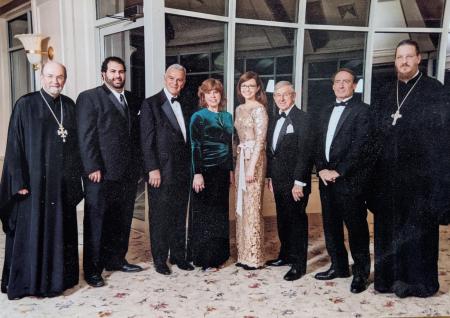
Dn Gregory during his time as a SVOTS Trustee, at the St Vladimir's Seminary 75th Anniversary Gala in 2013, alongside (from left), The Very Rev. Dr Chad Hatfield, former SVOTS President, Mr Alex Machaskee, Trustee Emeritus and former Executive Chair of the Board; Presvytera Sharon Rubis, a Trustee and Co-chair of the Anniversary Gala committee; Tatiana Hoff, a Trustee and Co-chair of the Anniversary Gala committee; Mr Tony Kasmer, of blessed memory, a longtime Trustee; Ted Bazil, longtime senior staff member at SVOTS; and the Very Rev. Dr John Behr, former SVOTS Dean and Professor of Patristics.
Members of the faculty expressed their congratulations to Dn Gregory and offered their prayers for his new ministry.
Director of the Doctor of Ministry Program, the Very Rev. Dr Sergius Halvorsen congratulated his colleague heartily, saying, “I've had the pleasure of knowing Dn Greg and counting him as a personal friend for almost twenty years. I worked with him when he was a student in our D.Min. program, and then was thrilled to welcome him as a faculty colleague. Dn Gregory has long embodied a spirit of service and diakonia, so it is with great joy that I join the chorus of all those saying, "Axios!" I pray that God would richly bless Dn Gregory and his family as he begins this new chapter of ministry and building up the Body of Christ.”
The Very Rev. Dr John Behr, former Dean and Professor of Patristics, also offered his congratulations and words of appreciation for Dn Gregory, remarking, “I am delighted to hear about Gregory’s ordination to the Holy Diaconate. It was clear that ordination would be in his future from his earliest days at St Vladimir’s, where I had the pleasure both to have him in class and also to work with him in the chapel, the two destinations that, as Fr Alexander Schmemann used to say, should be the places where seminarians are always headed. In the former, Dn Gregory could always be counted on to bring both insight and humor into our discussions, and in the latter, he fulfilled the role of ecclesiarch with diligence and grace. Dn Gregory has continued his ministry with love and energy over the years; it has been my great pleasure to keep in touch with him as a good friend, and also to visit with him and his community to lead retreats. I am sure that his ministry will bear ever more fruit. Axios!”
Interim President and Academic Dean, Dr Ionuț-Alexandru Tudorie, who offered his presence and prayers at St George Church in Phoenix for the ordination, added his words of appreciation for Dn Gregory, noting the “great joy that Dn Gregory, already a devoted servant of Christ and the church, and a beloved member of the D.Min. faculty, has now been ordained to Holy Orders. We pray for him and his family that God grants them many blessed years in continued ministry!”
Article adapted in part from antiochian.org. Photo credit: John Karadsheh and Issa Sweilem
In Memoriam: Archbishop Anastasios of Tirana, Durrës and All Albania
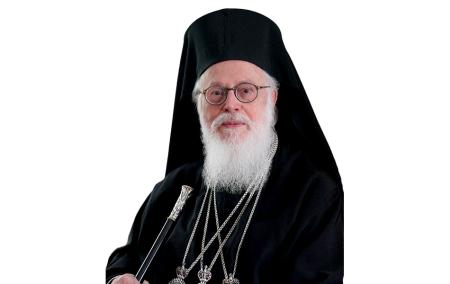
With faith in Christ and hope in the resurrection, we join the many voices sharing the news of the repose of His Beatitude Archbishop Anastasios of Tirana, Durrës and All Albania. His Beatitude was 95 years old.
His Beatitude Archbishop Anastasios of Tirana, Durrës, and All Albania was a visionary leader who played a pivotal role in restoring and revitalizing the Orthodox Church of Albania after decades of oppression under communist rule. Elected Archbishop in 1992 by the Holy Synod of the Ecumenical Patriarchate, he undertook the immense task of rebuilding a church that had been nearly eradicated. Over the following decades, he oversaw the construction and restoration of over 450 religious and community buildings, including more than 150 new churches, monasteries, seminaries, and schools. He established institutions such as a theological seminary, a printing press, medical centers, and youth programs, ensuring the church’s sustainability and its ability to serve the faithful.
Beyond physical reconstruction, Archbishop Anastasios nurtured the spiritual and communal life of Albanian Orthodoxy. He trained and ordained a new generation of clergy, created a self-sufficient church administration, and developed charitable initiatives that supported Albanians of all backgrounds. Under his leadership, the church provided critical humanitarian aid, including assistance to victims of the Bosnian War and Kosovar refugees, regardless of their religious affiliation.
Archbishop Anastasios was also a distinguished academic, earned both his B.D. and Th.D. with highest honors before serving as Professor of History of Religions (1972–1992) and Dean of the Theological Faculty of the National and Kapodistrian University of Athens (1983–1986); he later became Professor Emeritus of the same university. His academic contributions were recognized globally, as he received honorary doctorates (Th.D., D.D., and Ph.D. honoris causa) from 19 universities across Greece, the United States, Cyprus, Romania, Georgia, Albania, and Italy. Additionally, he was a Corresponding Member of the Academy of Athens (1993–2005) and an Honorary Member since 2006.
Before his tenure in Albania, Archbishop Anastasios had already established himself as a distinguished theologian and missionary. He played a pioneering role in rekindling the Orthodox interest in foreign missions (from 1958). He was ordained Deacon (1960); Priest-Archimandrite (1964), Bishop of Androussa (1972) for the position of the General Director of the Apostolike Diakonia of the Church of Greece (1972-92); Locum Tenens (Acting Archbishop) of the Holy Metropolis of Irinoupolis in East Africa (1981-1990); Metropolitan of Androussa and Patriarchal Exarch in Albania (1991-1992), and then Archbishop of Tirana, and All Albania (June 1992 onward). His earlier missionary work in East Africa, particularly in Kenya, Uganda, and Tanzania, helped strengthen Orthodox communities, ordain local clergy, and establish seminaries and schools.
A firm advocate of inter-Christian dialogue, Archbishop Anastasios played a significant role in the World Council of Churches, serving on its Central Committee and later as a member of its presidium.
His Beatitude published two books with SVS Press and contributed to the St Vladimir’s Theological Quarterly. His publications with the Press include Facing the World, Orthodox Christian Essays on Global Concerns, published in 2003, and In Albania: Cross and Resurrection, published in 2016, translated by the Archdeacon Dr John Chryssavgis. He also visited St Vladimir’s Seminary on a number of occasions, receiving an honorary doctorate in 2003.
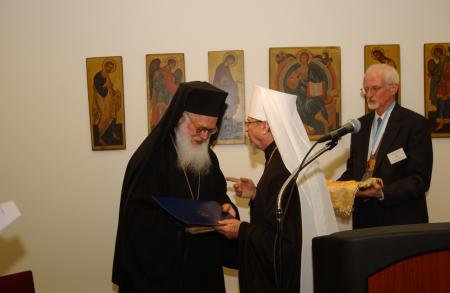
His Beatitude Archbishop Anastasios receiving a Doctor of Divinity, honoris causa, from St Vladimir’s Seminary in 2003
In 2011, three SVOTS seminarians visited Albania as the culmination of a summer course titled "The Missiology of Archbishop Anastasios (Yannoulatos) and Practical Evangelism," taught by Fr Luke Veronis.
During his last visit in 2014, His Beatitude met for a conversation about missions and book publishing with administrators, faculty, and staff from the seminary, His Beatitude Metropolitan Tikhon, primate of the OCA and The Very Rev. Dr. John Jillions, OCA chancellor at the time, as well as several other hierarchs and representatives of local churches.
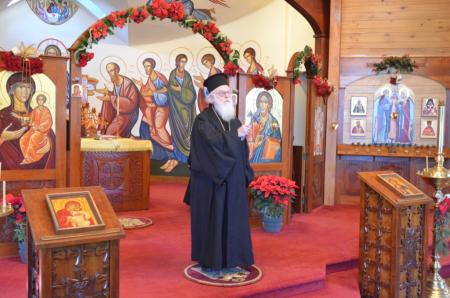
His Beatitude Archbishop Anastasios in Three Hierarchs Chapel, 2014
Dr Ionuț-Alexandru Tudorie, Interim President and Academic Dean, offered his reflections on the repose of His Beatitude Archbishop Anastasios, saying, “The St Vladimir’s Seminary community mourns the repose of such a great luminary for our contemporary Orthodox Church; we are commemorating him in our prayers and chapel services every day. However, we also rejoice in the hope that such a ‘good and faithful servant’ has departed this life to eternal rest in the presence of our Lord.”
May the memory of Archbishop Anastasios be eternal!
42nd Annual Father Alexander Schmemann Memorial Lecture and Mid-Year Commencement
In celebration of the Feast of Three Hierarchs, St Vladimir’s Seminary will celebrate the Divine Liturgy on Thursday, January 30, at 9 a.m. at Three Hierarchs’ Chapel.
On Thursday at 7 p.m., in the Metropolitan Philip Auditorium, St Vladimir’s Seminary will hold its Commencement ceremony for all mid-year graduates. Following the ceremony, the 42nd Annual Father Alexander Schmemann Memorial Lecture will begin. This year, Dr Henry Maguire, Emeritus Professor of the History of Art at Johns Hopkins University, will deliver the keynote presentation, “Heaven to Earth, Earth to Heaven: Neoplatonic Theology and the Art of Byzantine Churches.”
Dr Maguire describes his presentation with the following summary:
Recently some scholars have interpreted early Byzantine churches, such as the great sixth-century church of Hagia Sophia in Constantinople, with reference to Neoplatonic ideas, especially those disseminated by the anonymous Christian writer known as Pseudo-Dionysios the Areopagite. But much less attention has been paid to the impact of Neoplatonism on the art of later Byzantine churches, those which dated to the period after the iconoclastic crisis of the eighth and ninth centuries. This lecture will look at some of these splendid medieval buildings in the light of Neoplatonic theology, using as our guide the voices of contemporary Byzantines who saw and used these buildings. Pseudo-Dionysios described a mystical hierarchy in which the material world, characterized by variety, reflects the light emanating from the One, the divine unity. Following these ideas, medieval writers gave to their churches a cosmic interpretation, seeing in their interiors a hierarchy of lights reaching up from the gleaming multicolored marbles of their pavements, which represented the diversity of the earth, to the overwhelming splendor of the gold mosaics in the vaults above, which represented the unity of the heavenly realm. In the words of one poem, the church was a ladder, leading up from the muted gleam of the earthly stones below to the more brilliant light of the heavenly orbit. This vertical exchange of light was associated by Byzantine writers on art with prayer, which reflected, as in a candle, the desire of the faithful ascending from earth, and was responded to by the greater light descending from heaven.
You are invited to attend the Liturgy, Mid-Year Commencement, and the lecture in person or watch live online. You will receive one link to watch both after you register. The lecture is free and open to the public.
Light reception to follow the lecture.
Registration Closed.
About Dr Henry Maguire:
Henry Maguire, Ph.D. is Emeritus Professor of the History of Art at Johns Hopkins University. He has also taught at Harvard and at the University of Illinois, Urbana-Champaign. From 1991 to 1996 he served as Director of Byzantine Studies at Dumbarton Oaks in Washington DC. He has authored six books on Byzantine art, and co-authored three more with his partner, Eunice Dauterman Maguire. Together with Ann Terry he carried out a survey and publication of the wall mosaics in the Cathedral of Eufrasius at Poreč, which was published in 2007. Throughout his career he has been interested in the relationships between art and literature in Byzantium, although he has also written on other topics, including ivories, Byzantine secular art, and attitudes toward nature in Byzantium.
Assistant Professor of Liturgical Theology Tonsured to the Small Schema
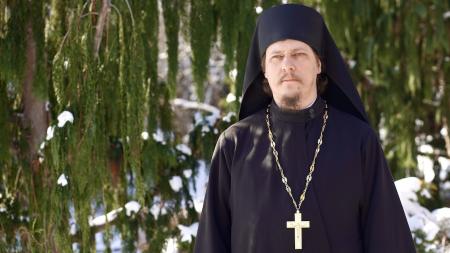
On Friday, January 17, the Assistant Professor of Liturgical Theology at St Vladimir’s Orthodox Theological Seminary (SVOTS), The Rev. Hieromonk Vasily (Vitaly Permiakov), was tonsured to the small schema at St Tikhon of Zadonsk Monastery (South Canaan, PA), by the Abbot of St Tikhon’s monastery, Archimandrite Sergius. A number of Fr Vasily’s fellow faculty members and his students attended the service in prayerful support of the beloved seminary professor. Interim President and Academic Dean, Dr Ionuț-Alexandru Tudorie remarked, “Fr Vasily is not only a very high caliber academic and teacher, he is a deeply prayerful and faithful person. All of his faculty colleagues, myself included, and—I am sure—the whole St Vladimir’s community will continue to pray for him in this new rank and responsibility within the Church. May he be saved in the angelic schema!”
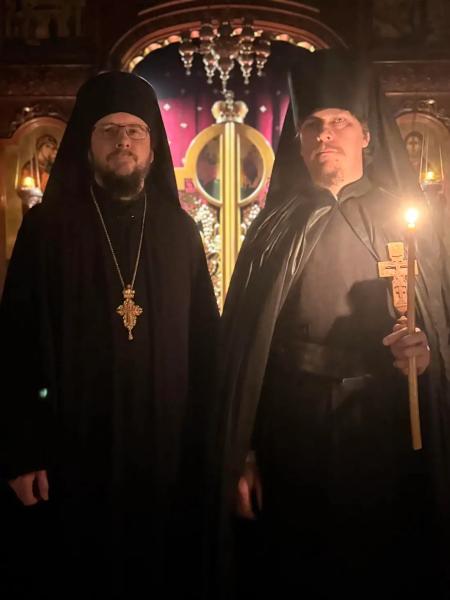
About the Rev. Hieromonk Vasily
Born to a Russian family in Riga, Latvia, the Rev. Hieromonk Vasily (Vitaly Permiakov), Ph.D. relocated to the United States in 1999 after completing his undergraduate studies. He entered St Vladimir’s Orthodox Theological Seminary (SVOTS) in Yonkers, NY with the blessing of late Archbishop Dmitri (Royster) of Dallas (OCA) (d. 2011). After finishing seminary, Fr Vasily enrolled in a doctoral program in Liturgical Studies at the University of Notre Dame, where in 2012 he defended his dissertation on the history and origins of the Byzantine rite for the consecration of churches. Fr Vasily taught at Holy Trinity Orthodox Seminary (Jordanville, NY) from 2011 to 2020, and joined the full-time faculty at St Vladimir's Seminary in August 2020.
Fr Vasily was tonsured to the ecclesiastical rank of reader in the Orthodox Church in America at Three Hierarchs Chapel, St Vladimir’s Seminary, in 2002. In 2021, on the Feast of the Annunciation, he was ordained subdeacon, also at Three Hierarchs Chapel. On the Feast of the Exaltation of the Cross, September 14, 2021, again at the Seminary chapel, he was ordained to the holy diaconate through the hand of His Beatitude, Metropolitan Tikhon. Three years later, His Beatitude ordained Fr Vasily to the priesthood on the Feast of the Exaltation of the Cross, September 14, 2024, at Three Hierarchs Chapel. On January 17, 2025, he was tonsured to the small schema at St Tikhon of Zadonsk Monastery (South Canaan, PA) with the name Vasily.
A Grateful Servant of the Seminary: Getting to Know the Very Rev. Dr Alexander Rentel
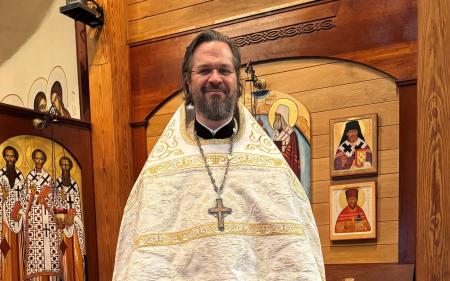
Fr Alexander Rentel (M.Div. ‘95) has dedicated much of his adult life to theological education at St Vladimir’s Seminary; as a student, professor, board member, and now, as the Chief Operations Officer (COO). We sat down with him to speak about his history with the seminary, his new role, and his thoughts for the future.
Fr Alexander, could you share your journey with the seminary—from your time as a student to becoming a professor and now the COO?
I knew that I was going to come to St Vladimir’s Seminary when I was a very young man. I knew that I was going to go to seminary, and there was only one place that I was going to go, and that was St Vladimir’s Seminary.
There was always a certitude in my head that I would become a priest, inspired by my father, the Very Rev. Daniel Rentel. When I was a young man, my father would speak in very glowing terms of Fr Alexander Schmemann and Fr John Meyendorff. He was not a graduate of St Vladimir’s Seminary (he graduated from St Tikhon’s Seminary in 1961), but he had a great love for Fr Alexander Schmemann and read and was inspired by him and the various publications that came out of SVS Press. I remember my father being deeply moved by the book, Our Hope, published by SVS Press in 1977. The book was a collection of sermons by Fr Dmitry Dudko, who, unfortunately, is somewhat of a controversial figure within the Russian Orthodox Church. However, his sermons in this book are on point–they spoke about a very real and dynamic faith in the Soviet Union. His words transcended that particular place and time and spoke to people around the Orthodox world.

Three generations of Rentels: Dimitrios, Fr Daniel, and Fr Alexander
My father was formally trained as a historian in Byzantine-Slavic Studies, so of course he also greatly enjoyed reading the works of Fr John Meyendorff, who worked in much of that same field.
So the publications coming out of the seminary were very influential to me as I grew up, but the recordings of liturgical music released by the seminary in the 70’s and 80’s were equally formative.
I remember how excited the OCA Orthodox world was when St Vladimir's Seminary began releasing its choir recordings, especially The Liturgy of the Presanctified Gifts (SVS Male Choir, 1972), Great and Holy Saturday (SVS Male Choir, 1975), Pascha (SVS Male Choir, 1977), and Orthodox Hymns of Christmas (St Vladimir's Liturgical Chorale, 1979). And then when The Divine Liturgy of the Orthodox Church, (St Vladimir's Liturgical Chorale, 1982) came out, it was on heavy, heavy rotation in my life.
My family loved liturgical music, and we would gather together, like some old-time family huddled around the radio for story time, and we'd listen to the albums. My grandfather, Michael Holovach, a very prominent choir director in the Pittsburgh area, my dad, who loved to sing, and my mother, Elaine Holovach Rentel, who directed choirs forever and a day, they would listen carefully to every track, and analyze each one. For me, when these albums came out, they were like thunderclaps; it was like somebody else hearing the Beatles for the first time.
And so in 1992 when I first came to seminary as a student in the fall, it was something that I had thought about, planned on, set as a star to navigate much of my life by–it felt like the most natural thing in the world to do.
I had a wonderful time and had a great group of classmates. I was accorded any number of great opportunities, to see and be with people and travel. I met my wife, Nancy Homyak Rentel, in the M.Div. program at the seminary, and she and I got married right after we graduated in 1995. I regularly think about the three years that I had at seminary as a wonderful time.

Fr Alexander and Mka Nancy as a young couple on the SVOTS campus
During my time as a student at seminary, I was deeply inspired and informed by the professors: Fr Tom Hopko, Fr Paul Lazor, Fr John Breck, Fr Paul Tarazi, Dr John Boojamra, Fr John Erickson, and Dave Drillock.
These men very much shaped my life and anything successful, anything positive that I've been able to do, I credit to them, and to my own parents. And where I've fallen short, well, I bear the burden for that.
One thing that always stayed with me, that I was especially taught by Fr Tom and Fr Paul, was a love for the liturgical services. Fr Paul taught us formally how to serve, but he also taught us reverence and love for the services, and he demonstrated that by example. His reverence was something that was given over to us. There was always an excitement with Fr Paul, and it was contagious.
Fr Tom taught in a very different way, by doing, by being. It might sound silly, but it was incredible for anybody who saw him do a great censing during Vigil, serve Daily Matins or the Liturgy, or just offer an extemporaneous sermon at the end of services. It was a master class on how to be a priest. I've tried to carry all those things that inspired me during seminary with me for my life as a priest.

During his ordination to the priesthood, July 21, 2001
After my wife and I graduated in May 1995, we got married in September, and I went on and did my doctoral work in Rome, and then I came back to the seminary in 2002. I started out as an assistant to Fr John Erickson, who was named Dean at the time, and I was teaching a few classes. I continued in various ways as a faculty member and had different administrative responsibilities. When Fr John Behr and Fr Chad Hatfield became Dean and Chancellor of the seminary, I began assisting Fr John Behr in the chapel as the seminary ecclesiarch. Then when Fr Chad became the rector, I assisted him until 2019 when I became the Chancellor of the Orthodox Church in America.
Now here in 2025, I've returned to the seminary as rector of the seminary chapel; I will be resuming my position as full-time Assistant Professor of Canon Law, and taking on the Chief Operating Officer position.
I can't say enough that the seminary has been at the forefront of my adult life, the adult life that I've shared with my wife and my three children. It's been formative for us. We've gone to services as a family here since 2002; two of our kids have been baptized here. I consider myself a very grateful servant of the seminary.
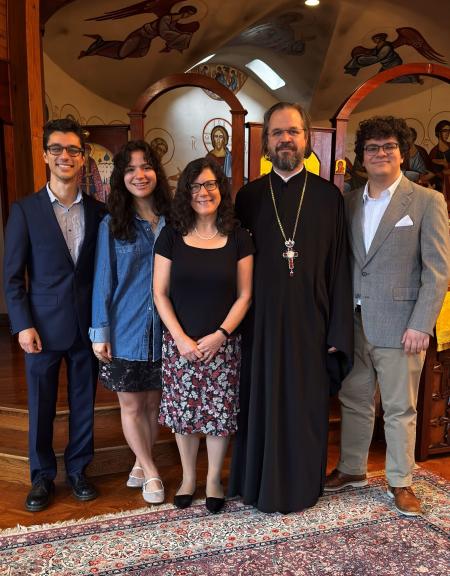
The Rentel family in Three Hierarchs Chapel: (from left) Dima, Maria, Mka Nancy, Fr Alexander, and Daniel
Could you say a few words about your time as OCA Chancellor, and how that experience will inform your work at the seminary moving forward?
One of the biggest lessons I've learned as chancellor came from traveling through our parishes and around the world. I've seen firsthand the impact that the seminary and SVS Press have had on these communities. Wherever you go, you can always find a graduate of the seminary, which is incredible. But what stood out most to me during my time as chancellor was the immense value of theological education, particularly residential theological education.

In the evening during the Council in Crete, Chania, Crete, 2016
I've been very much impressed by the words of His Eminence Archbishop Michael, Rector and CEO of St Tikhon’s Seminary, who speaks eloquently and beautifully about the importance of residential theological education. He especially points out that residential theological education is formative. Why do I emphasize this? Because the Church today must address the real questions people have, in the present time and place. Theologically trained men and women, especially those who have experienced formal theological education, are uniquely equipped to provide these answers.
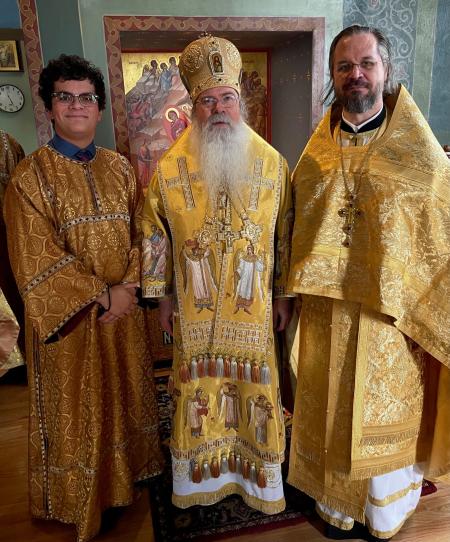
Fr Alexander during his time as OCA Chancellor, with His Beatitude Metropolitan Tikhon and his son, Daniel at St Tikhon’s Monastery
Now, you can go to a religious department in a university, or a divinity school, for example, and come to many of the same answers. We also have strong programs within the OCA, such as the Diaconal Vocations Program, which trains excellent men who do a very good job. However, what sets residential theological education apart is the opportunity to form men and women, to develop a person’s character. Beyond providing theological knowledge, students living on campus experience spiritual formation through living in community, attending services in chapel, fulfilling community service assignments, and serving others during their CPE (Clinical Pastoral Education) programs.
I think especially going to the divine services fulfills something that our blessed former dean, Fr Alexander Schmemann pointed out many, many years ago: the revelation that is offered to us in the divine services is true theology. Liturgical theology is not theology about liturgy. It's not a theology that's derived from liturgy. It's the theological method of encountering the true and real revelation of God accorded to us in the services. A seminary offers a fuller cycle of services that parishes may not be able to provide, including early mornings, evenings, and sometimes late-night services. This is key to spiritual formation in residential theological education.

Censing the congregation during the Paschal Liturgy at Three Hierarchs Chapel
Another vital aspect of seminary life is the fellowship. The friendships formed through that fellowship sustain graduates for the rest of their lives. This is something I’ve witnessed repeatedly in my travels. Theology is not only a discipline that's learned, it's something that is very much worked at. One passage from the Bible that is so powerful to me is when Paul, after his revelation on the road to Damascus, was told by God through Ananias that he must learn how much he would suffer for the sake of the Gospel. And so life at seminary is not necessarily going to be easy. I heard Fr Chad speak about this many times: theological education is something that you suffer. That's not grim, that's part of our evangelical life. You have to shake loose of the old man to put on the new man and bring this gospel to the people, to the nations.
What does your role as Chief Operations Officer entail, and how does it align with the seminary's mission and vision?
The role of Chief Operations Officer is an interesting one. I always say that in all my years at the seminary—whether as a student, professor, seminarian, ecclesiarch, or in any other capacity—I've always enjoyed and taken advantage of the operations side of things, but I’ve never actually been involved in it. So, stepping into the role of COO, and working with Dr Tudorie and Ted Bazil, has been a new experience for me. Ted, a great resource for the seminary, works just next door. I've also had the privilege of working with others in operations, like Raphael, Yuri, and Georgios and Oscar in technology.
The role has given me the opportunity to better understand the seminary’s operations, including the physical plant and campus—everything from the buildings and grounds to the maintenance and upkeep. It's a monumental task, and I’ve been trying to help ensure the good ordering of these areas.
This is an area I’m still learning about, and I approach it with humility, seeking guidance from my colleagues. I’m fortunate to have great teachers in Rafael, Yuri, Ted, Georgios, and Oscar, who have been providing me with a lot of information. It can be overwhelming at times, especially for an academic priest used to working with words and concepts, but I’m trying to do the best I can.
How do you see the seminary evolving operationally in the next 5-10 years, and what initiatives are you most excited about?
Any initiative that happens will need to be done in collaboration with the incoming seminary leadership, as we are in a position of transition. It will also need to be done in close collaboration with His Beatitude Metropolitan Tikhon and the seminary’s Board of Trustees. I love the physical place—the seminary campus is beautiful. Of course, there will have to be new initiatives, as every physical plant requires regular maintenance and updates. But in terms of priorities, that has to be done collaboratively. My hope and desire would be to really enhance the spaces—not necessarily expand, but improve and create really inviting common areas. These spaces would allow us to bring people into the seminary and show them our life—show them who we are.
If people have questions about us or have read our promotional materials, we want to give them a chance to experience our life firsthand. Let them hear our choir sing, see our students give sermons, and be inspired by the way we live day to day. Chapel spaces, the refectory, and the grounds could always use a bit of sprucing up, but this is the vision I’m excited about.
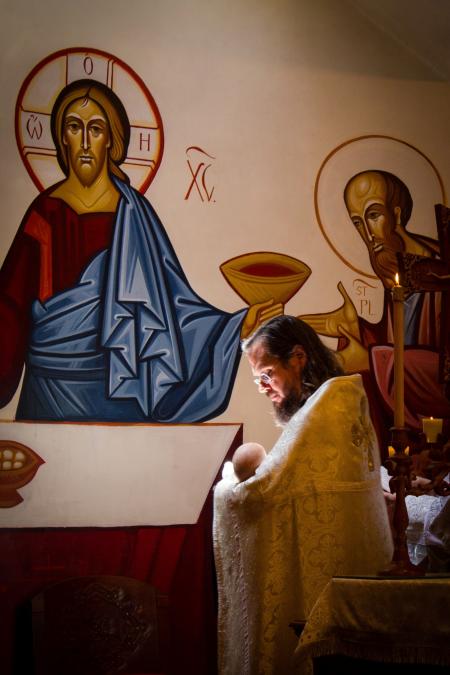
Fr Alexander churches Luca Margheritino, Three Hierarchs Chapel, June 2014
Can you share a favorite memory or story that reflects the spirit of the seminary?
I don't have any stories, but I will share this. There are many times when I'm in the seminary chapel, which is perhaps one of my favorite places on Earth, and I'm hearing the familiar melodies, the hymns, watching the recurring patterns of the services that I've seen many, many times, and sometimes I let my mind go and think about all of the people who I've been here with, going back to when I was a student or when I first came back as a faculty member. I think not only of the many colleagues that I've been blessed to serve with–deacons, priests, my professors–but also my classmates and the many, the many, students that I've had. And I'm not trying to be overly mystical or strange or anything like that, but sometimes it feels like I can see everybody here at the seminary chapel all together, almost as if there's a flattening of time, and I can see people who were not at the seminary at the same time standing next to each other.
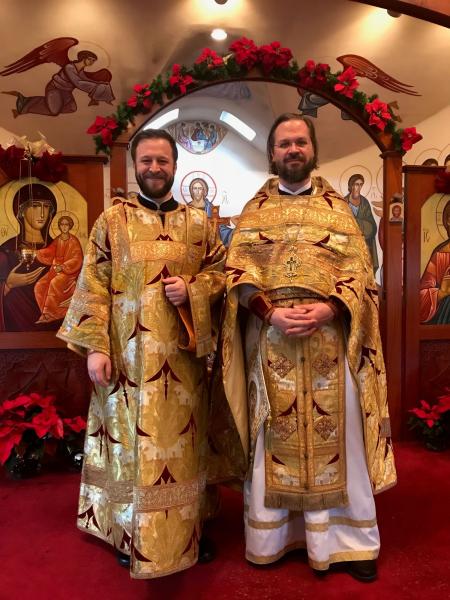
Fr Alexander and Dn Evan Freeman, feast of the Nativity, 2017
I've been very fortunate to be inspired, to be taught, not only by great professors, but also, by seminarians, the great Malankara students we have here, who teach me about life in India as a Christian, or the great Armenian students who come here from St Nersess Seminary. In other words, I've been inspired, encouraged, and formed, not only by the professors who taught me, my colleagues and priests, and other clergy here, but also by generations of students.
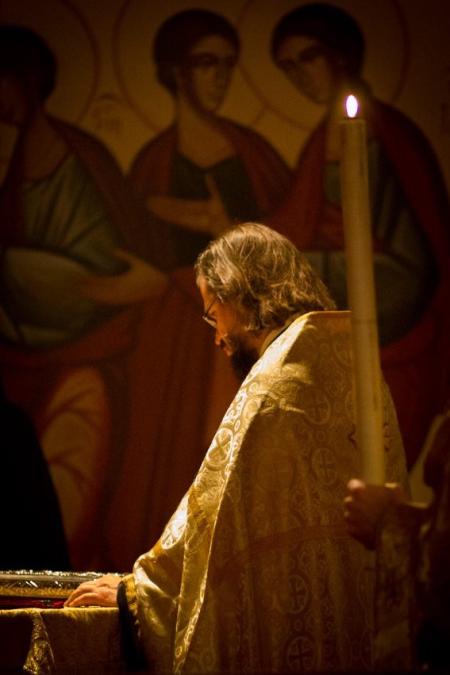
Serving in Three Hierarchs Chapel, Theophany 2025
